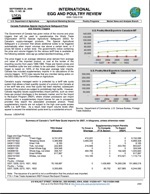
Canada Publishes Special Agricultural Safeguard Price and Volume Triggers
By Canadian Poultry
Features Profiles ResearchersWEB EXCLUSIVE
Canada publishes Special Agricultural Safeguard Price and Volume Triggers
The Government of Canada has given notice of the volume and price
triggers that will be used to operationalize the World Trade
Organization (WTO) Special Agricultural Safeguard (SSG) for
Canada's supply-managed products
The Government of Canada has given notice of the volume and price
triggers that will be used to operationalize the World Trade
Organization (WTO) Special Agricultural Safeguard (SSG) for
Canada's supply-managed products.
The Special Agricultural
Safeguard is a provision that allows additional duties to be triggered
automatically when import volumes rise above a certain level, or if
prices fall below a certain level.
The government's notice containing
the price and volume triggers for the various tariff lines is available at
the following website: www.agr.gc.ca/itpd-dpci/technical/ssg_e.htm
The price trigger is an average reference price derived from average
unit value of the imported product, or cost at the border of the
importing country from years 1986-1988. These are historic prices and
are therefore quite low and unlikely to be activated. Canada's volume
trigger is based on 125% of the three-year average total imports.
Canada has included supplementary imports in its calculations of the
volume triggers.
WTO rules require that any member taking action on
the SSG notify the WTO Committee on Agriculture.
Canada's supply managed sector is protected by a tariff rate quota
system that allows a fixed quantity (quota) of a product into Canada at
a low tariff rate and, once that quota has been reached, subsequent
imports of the product are subject to prohibitively high tariffs. However,
Canada regularly issues supplementary import permits, such as when
there are product shortages in the domestic market, and for the Import
to Re-Export Program (IREP), where chicken processors can import
chicken under a supplementary import license for use in processing
provided they export the associated processed product. These
supplementary imports are not subject to the high over-quota access
tariffs (i.e. tariff free).
As a result, total import volume levels often
appear to exceed the established quota level by a substantial amount.
Print this page
